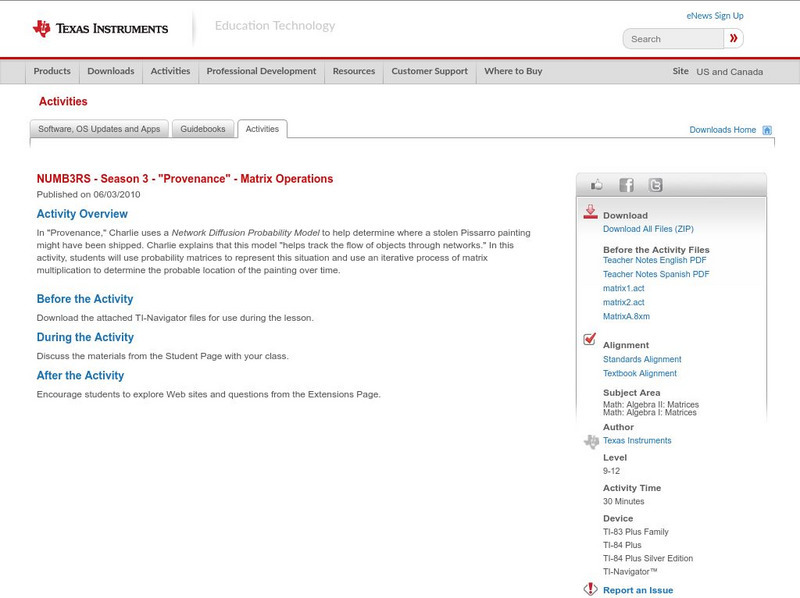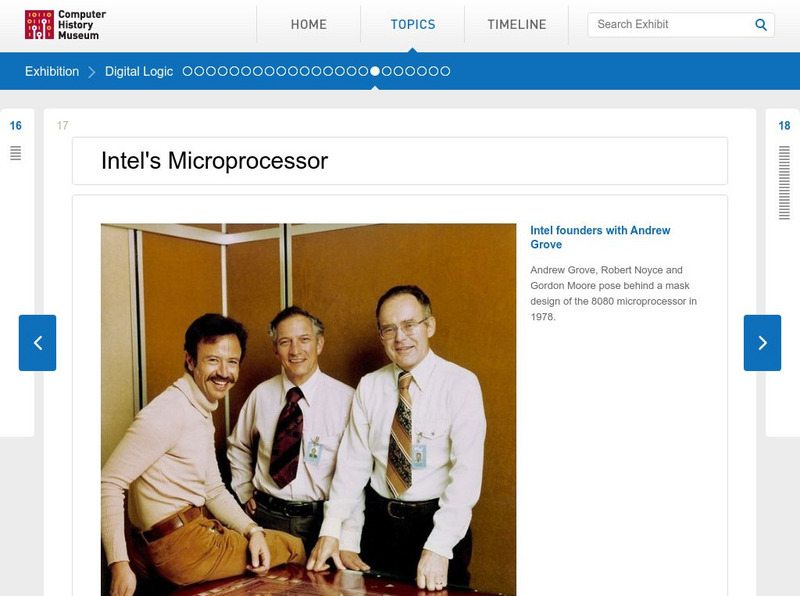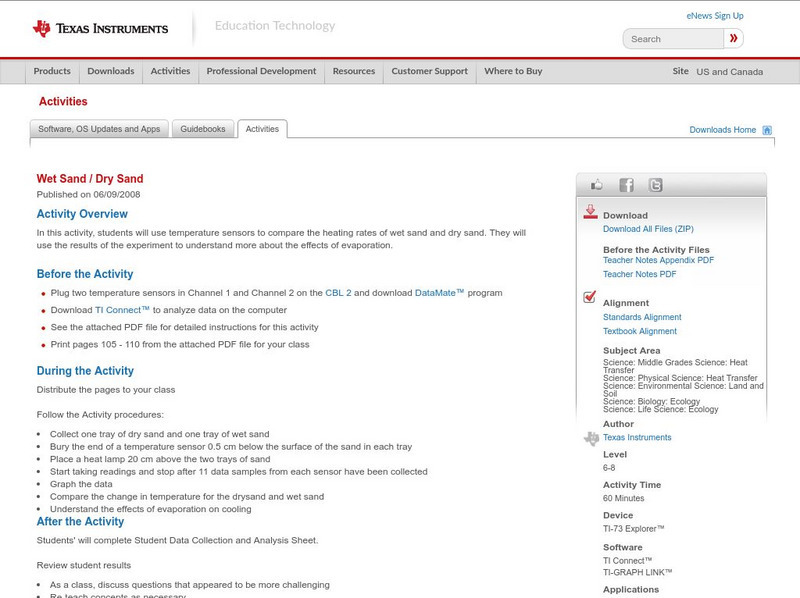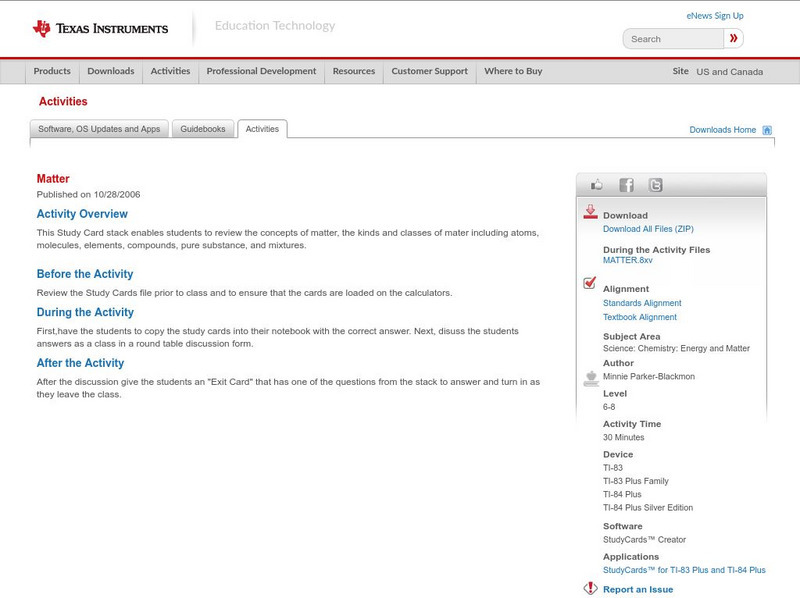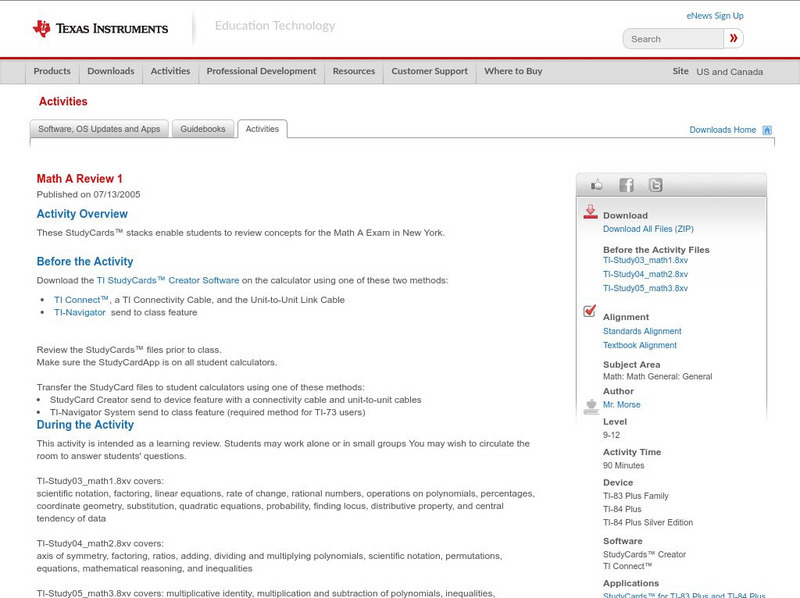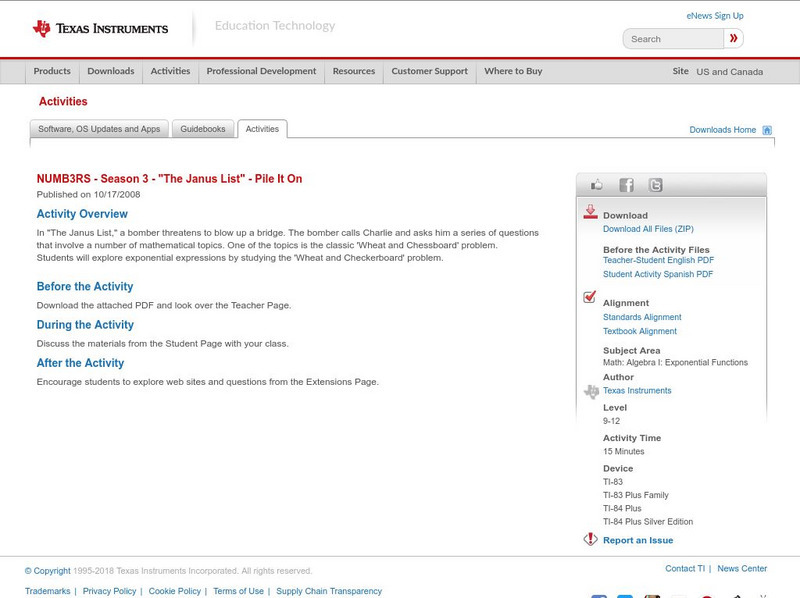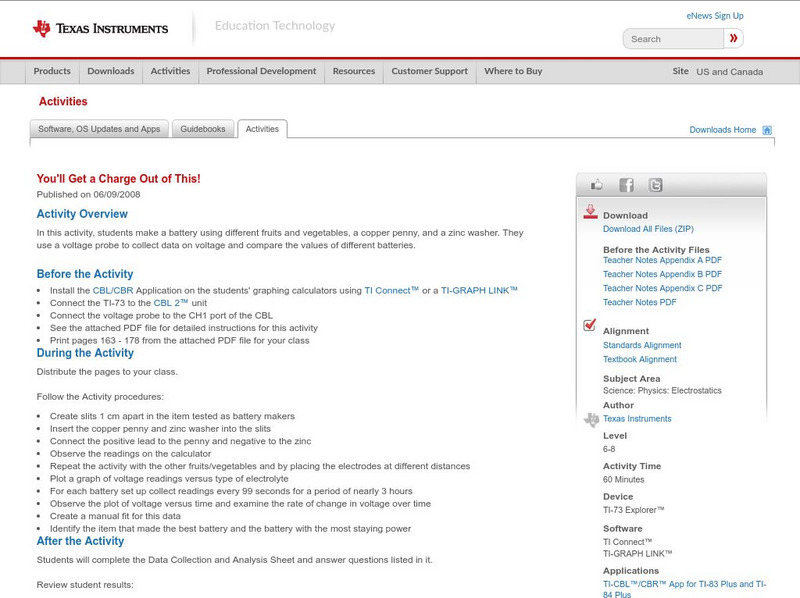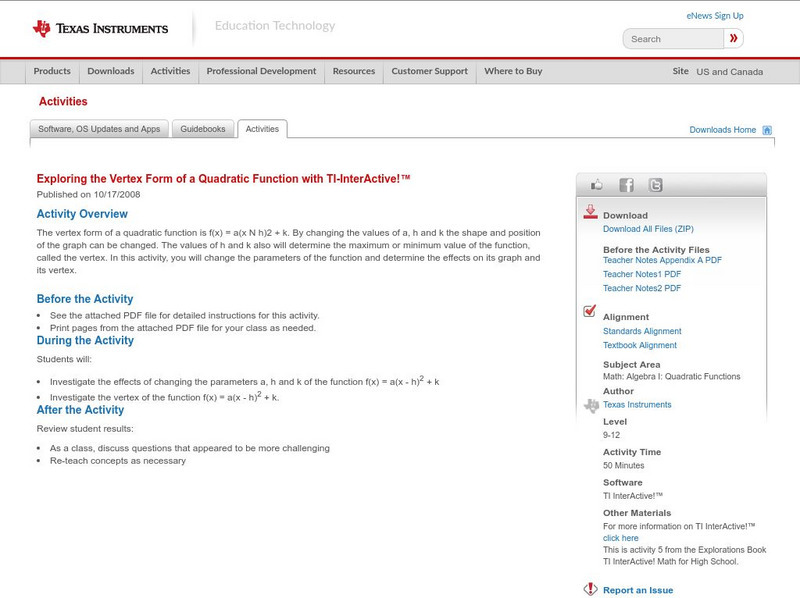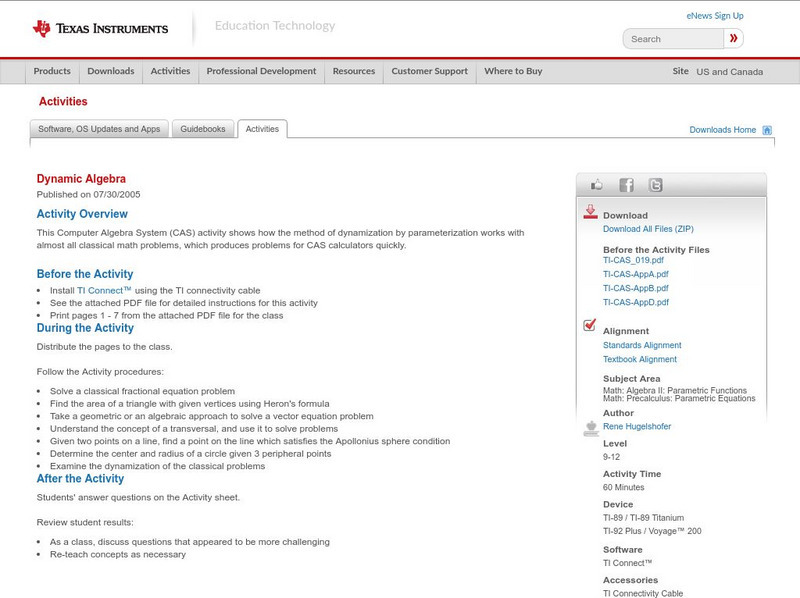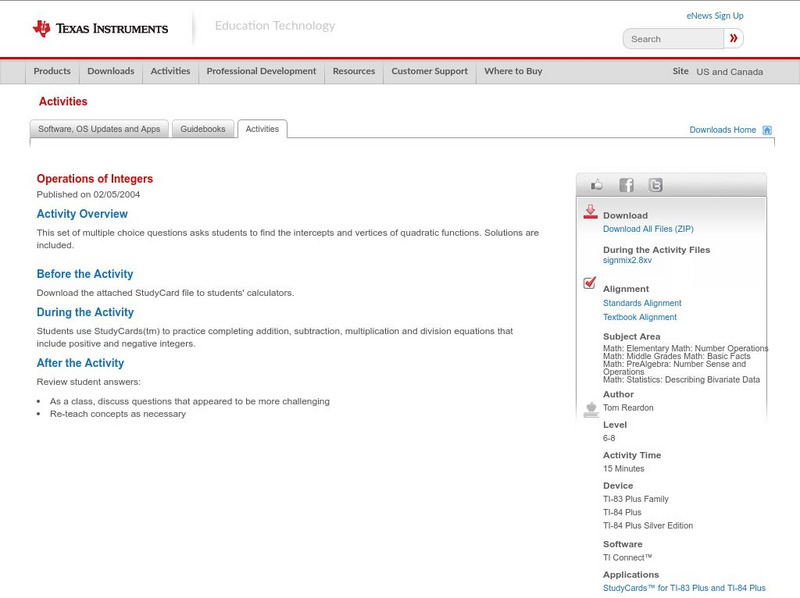Texas Instruments
Texas Instruments: Numb3 Rs: Matrix Operations
Based off of the hit television show NUMB3RS, this lesson shows students how using matrix multiplication can lead to solving real-world problems. In this situation, a painting is missing and the probability of travel betweek five cities...
Texas Instruments
Texas Instruments: Numb3 Rs: Driving With Djikstra
Based off of the hit television show NUMB3RS, this lesson introduces students to one of the prominent algorithms in graph theory used to find shortest paths -- the Djikstra Algorithm. The lesson includes four graphs of increasing...
Texas Instruments
Texas Instruments: Explore Graphs and Factors
Students use a graphing calculator to explore the relationship between the linear factors of a quadratic function and its zeros. They learn that the x-intercepts and axis of symmetry of a quadratic function can be determined from its...
Nobel Media AB
The Nobel Prize: The History of the Integrated Circuit
A detailed, in-depth history of the Integrated Circuit is provided at this site. The information is complete with biographical information, general history, series of steps, pictures, and additional links.
Computer History Museum
Computer History Museum: I Cs, Microprocessors, & Memory
Brief description of ICs, Microprocessors, and Memory, describing the breakthroughs in technology design that dramatically reduced the size, power requirements, and cost of a computer. The various Integrated Circuit artifacts are on...
Computer History Museum
Computer History Museum: Integrated Circuits
Brief description on the design of Integrated Circuits along with images showcasing the assorted types. The various Integrated Circuit artifacts are on display at the Computer History Museum. This site provides a glimpse into the...
Texas Instruments
Texas Instruments: Biggest Box
A classic problem looking at maximizing volume by varying the height of a box. Uses graphing calculators to analyze data collected and to model a cubic equation. Look for points that maximize volume while developing a preliminary notion...
Texas Instruments
Texas Instruments: Get on the Stick
In this activity, students use a CBR 2 to measure the reaction time of catching a stick. They also learn how to interpret a box plot, and make a five number summary of a single variable data set.
Texas Instruments
Texas Instruments: Why Aren't There More Reds in My Bag?
Students use small bags of M&M's to make predictions, gather data, and display color distribution results in a circle graph. They explore the concept of ratios and sample size.
Texas Instruments
Texas Instruments: Wet Sand / Dry Sand
In this activity, Students can use temperature sensors to compare the heating rates of wet sand and dry sand. They will use the results of the experiment to understand more about the effects of evaporation.
Texas Instruments
Texas Instruments: Matter
This Study Card stack enables students to review the concepts of matter, the kinds and classes of mater including atoms, molecules, elements, compounds, pure substance, and mixtures.
Texas Instruments
Texas Instruments: Drawing 3 Dimensional Figures
In this activity, students learn to draw a three-dimensional figure using Isometric Dots in the Explorer Draw App on the calculator. They also find the area and volume of a rectangular prism. [Requires Adobe Reader.]
Texas Instruments
Texas Instruments: Math a Review 1
This StudyCards stack enables students to review concepts in algebra, arithmetic, and geometry, in preparation for the Math A Exam held in New York. They solve problems involving scientific notation, factoring, linear equations, rate of...
Texas Instruments
Texas Instruments: Numb3 Rs: Pile It On
Based off of the hit television show NUMB3RS, this lesson focuses on the age-old problem of whether to accept a large sum of money, or to accept a proposition in which a chessboard is filled with grain (each square getting double the...
Texas Instruments
Texas Instruments: Class of Gold
Students investigate Fibonacci numbers and the ratios of successive Fibonacci numbers.
Texas Instruments
Texas Instruments: You'll Get a Charge Out of This!
In this activity, students make a battery using different fruits and vegetables, a copper penny, and a zinc washer. They use a voltage probe to collect data on voltage and compare the values of different batteries.
Texas Instruments
Texas Instruments: Exploring the Vertex Form of a Quadratic Function
In this activity, you will change the parameters of the function and determine the effects on its graph and its vertex.
Texas Instruments
Texas Instruments: Dynamic Algebra
This Computer Algebra System (CAS) activity shows how the method of dynamization by parameterization works with almost all classical math problems, which produces problems for CAS calculators quickly.
Texas Instruments
Texas Instruments: What's in a Name? Explorations in the Coordinate Plane From
Students will plot points in a coordinate plane and reflect those points across the axes using a MIRA and then using the graphing calculator STAT, STAT PLOT, and GRAPH menus graph the image on the graphing calculator screen.
Texas Instruments
Texas Instruments: Numb3 Rs: Cycloid Ii
Based off of the hit television show NUMB3RS, this lesson provides an introduction to the integral in the sense of finding the length of a curve. In the lesson, student deconstruct a cycloid (formed by following a piece of tape on the...
Texas Instruments
Texas Instruments: Exponent Game
In this activity, students compare powers and decide whether to add or subtract values to a cumulative total so that the total stays as close to zero as possible.
Texas Instruments
Texas Instruments: How Totally Square!
Students make a variety of sizes of squares using square color tiles. With the squares, the students discover patterns and make prediction. They explore and understand the concept of square numbers.
Texas Instruments
Texas Instruments: Investigating Segments in a Quadrilateral
In this activity, students use the tools of Cabri Jr to test their knowledge of geometry. They investigate the properties of the shape formed by connecting the midpoints of adjacent sides of a quadrilateral.
Texas Instruments
Texas Instruments: Operations of Integers
This set of multiple choice questions asks students to find the intercepts and vertices of quadratic functions. Solutions are included.


